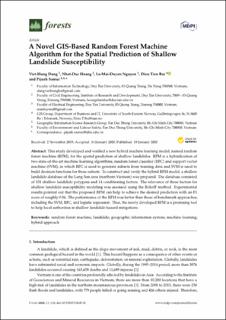A Novel GIS-Based Random Forest Machine Algorithm for the Spatial Prediction of Shallow Landslide Susceptibility
Peer reviewed, Journal article
Published version
Permanent lenke
https://hdl.handle.net/11250/2736620Utgivelsesdato
2020Metadata
Vis full innførselSamlinger
- Institutt for økonomi og it [161]
- Publikasjoner fra CRIStin [3623]
Originalversjon
Dang, V. H., Hoang, N. D., Nguyen, L. M. D., Bui, D. T., & Samui, P. (2020). A novel GIS-based random forest machine algorithm for the spatial prediction of shallow landslide susceptibility. Forests, 11(1). https://doi.org/10.3390/f11010118Sammendrag
This study developed and verified a new hybrid machine learning model, named random forest machine (RFM), for the spatial prediction of shallow landslides. RFM is a hybridization of two state-of-the-art machine learning algorithms, random forest classifier (RFC) and support vector machine (SVM), in which RFC is used to generate subsets from training data and SVM is used to build decision functions for these subsets. To construct and verify the hybrid RFM model, a shallow landslide database of the Lang Son area (northern Vietnam) was prepared. The database consisted of 101 shallow landslide polygons and 14 conditioning factors. The relevance of these factors for shallow landslide susceptibility modeling was assessed using the ReliefF method. Experimental results pointed out that the proposed RFM can help to achieve the desired prediction with an F1 score of roughly 0.96. The performance of the RFM was better than those of benchmark approaches, including the SVM, RFC, and logistic regression. Thus, the newly developed RFM is a promising tool to help local authorities in shallow landslide hazard mitigations.

